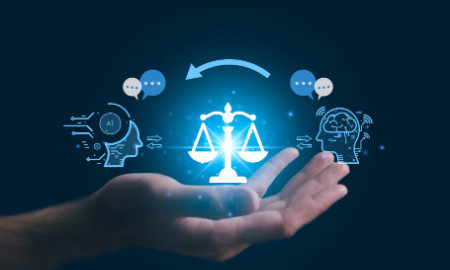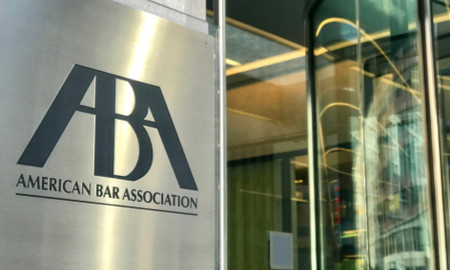Sign up for our free daily newsletter
YOUR PRIVACY - PLEASE READ CAREFULLY DATA PROTECTION STATEMENT
Below we explain how we will communicate with you. We set out how we use your data in our Privacy Policy.
Global City Media, and its associated brands will use the lawful basis of legitimate interests to use
the
contact details you have supplied to contact you regarding our publications, events, training,
reader
research, and other relevant information. We will always give you the option to opt out of our
marketing.
By clicking submit, you confirm that you understand and accept the Terms & Conditions and Privacy Policy
The UK Supreme Court ruled on 20 December last year that only a ‘natural person’ who has derived an invention can be named as its inventor, whereas a computer cannot. As such, for the foreseeable future an AI algorithm or system cannot be named as inventor on a patent application.
Is this a victory for common sense or does it just confirm that intellectual property law and the court system are out of date?
Dabus AI – the legal challenge
A series of cases have been brought worldwide by a group of academics and inventors regarding a generative AI system, called Dabus AI. The group contends that Dabus AI is solely responsible for its own innovative outputs and is allegedly able to produce useful outputs without human intervention. Two of these innovations have been the subject of patent applications. They related to a novel interlocking food container that allowed for easy reheating of the food contained, and a warning light or beacon that flickers in a rhythm similar to neural activity, which allows it to attract attention in an emergency.
Developed by Dr Stephen Thaler in 1994, Dabus AI claims to mimic human cognition and independently generate inventions by being able to adapt to different inputs without the need for human intervention. As the inventions which were the subject of the two patent applications were said to be solely created by Dabus AI, Dr Thaler contended that Dabus AI should be named as their inventor.
In the world of intellectual property law, there is a consensus that the owner of a patent is the inventor, unless they have assigned their rights to another party. This assignment of rights may be automatic, for example an employer will typically automatically own the rights to an invention made by an employee during the course of their employment. Furthermore, an inventor is deemed to be a natural person who has contributed to the invention in a material way, and therefore it is generally accepted that only humans can be named as inventors.
Seeking to contest this widely-accepted point of law, Dr Thaler and his group believed that Dabus AI should be named as sole inventor. However, their patent applications were refused by the UKIPO (and other patent offices around the world) on the grounds that a piece of software or AI algorithm could not be named as inventor. They also believed that as they own Dabus AI, any rights to an invention created by it should automatically belong to Dr Thaler through the doctrine of accession.
Appeal upholds the status quo
At the UK Supreme Court hearing on 20 December, the judges decided to uphold existing property law. The judges concluded that an inventor can only be a natural person and that it was not possible for an AI, or indeed any other software program, to be named as inventor.
Additionally, the Supreme Court ruled that as no human inventor had been identified, Dr Thaler was not entitled to the patent. The reasoning given was that Dabus AI was not capable of owning rights, nor could it transfer them.
Had the decision been different it could have had significant repercussions for companies innovating using AI tools. For example, it is a widely accepted point of law that property can only be owned by a ‘legal person’, that is to say a person or company. A software program is not considered to be a legal person and therefore cannot own property, including intellectual property rights, such as patents, trademarks, designs and copyright. If the Supreme Court had decided that software could be named as inventor, this could have brought into question the stability of centuries-old legislation concerning the ownership and transfer of property. Allowing a non-legal person to own property would have gone against all existing law in this area.
Furthermore, if the owner of the software was deemed to be entitled to the rights for an invention this would have created significant uncertainty for companies using AI. Many companies do not create or own the software used in the innovation process and instead use licensed software for this purpose. Had the Supreme Court ruled that the owner of the software was entitled to the rights in a patent, which was derived from licensed software, this could have led to questions over who actually owned the IP rights – the software owner or the licensor? Such uncertainty could have caused companies to avoid using AI software for fear of losing their rights.
Thankfully, by deciding that only inventors can be human, the UK Supreme Court has avoided such problems. Given the potential implications regarding the ownership of rights, the decision has provided certainty to companies regarding their IP.
AI inventorship debate continues
Critics of the decision will say that given the rapid advancement of AI and the now ubiquitous nature of AI innovations, that the courts have missed an opportunity to update the law. However, these arguments often overlook the wider implications around ownership and transfer of rights. Additionally, while the courts accepted the premise that Dabus AI was capable of inventing without human input, this was only accepted for the sake of argument in order to explore the issue of inventorship, and doubts remain as to whether AI systems are presently capable of inventing without human input. While the question around AI inventorship has been resolved for the time being, there is a sense that the law will need to develop as innovation in AI increases.
Diego Black is a partner and patent attorney at European intellectual property firm, Withers & Rogers.
Email your news and story ideas to: [email protected]











